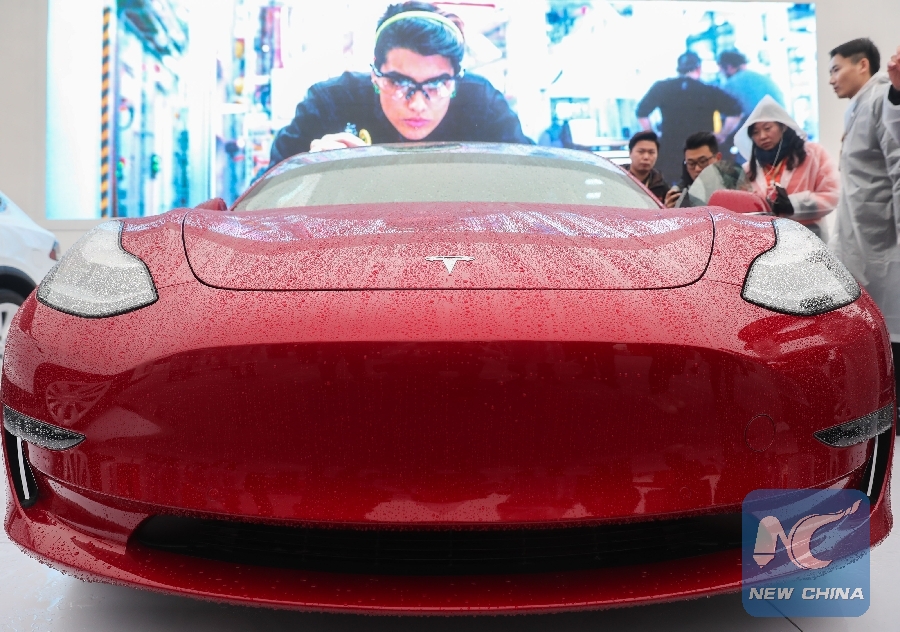
File Photo: A Tesla Model 3 is displayed at the groundbreaking ceremony of Tesla Shanghai Gigafactory in Shanghai, east China, Jan. 7, 2019. (Xinhua/Ding Ting)
NEW YORK, Feb. 20 (Xinhua) -- The potential for the United States and China to deepen collaboration in the booming electric vehicle (EV) industry is expected to be significant, experts have said.
"China and the United States are the world's two largest EV markets," David Sandalow, an inaugural fellow at Columbia University's Center on Global Energy Policy, told Xinhua Tuesday. "Both countries can benefit by trading with each other and learning from each other."
PROMISING INDUSTRY
The sales of EVs have been ramping up in recent years. The market will continue to grow for a few reasons, according to some experts.
Compared with conventional vehicles, EVs help to reduce local air pollution, reduce global warming as well as avoid the vulnerability some countries experience due to the volatility of the oil market, said Sandalow, who has served in senior positions at the White House, State Department and the U.S. Department of Energy.
"There's a steady market shift toward electric vehicles ... in both the United States and China, sales grew very significantly last year and in prior years, in many European countries as well," he added.
China is the world's largest EV market, with sales of new energy vehicles soaring 61.74 percent year on year to 1.26 million units in 2018.
In 2030, China's EVs will reach 100 million while the power of the vehicle battery will exceed 1 billion kilowatts, according to Shirley Cheng, president of China State Grid U.S. representative office.
At a panel discussion themed electric vehicle charging at Columbia University on Monday, Cheng said the reading will be around 200 million in 2040, while citing some industrial estimates which she deemed "still quite conservative."
Experts said a slew of sound policies and measures are also among the major reasons behind a possible explosive growth of the Chinese EV market.
"The Chinese government has been committed to EV deployment for many years now with a variety of incentive programs, as both central and provincial governments have been committed to deploying EVs," said Sandalow, also co-author of a report on EV charging in China and the United States.
The reported issued this month showed that one of the biggest barriers to the deployment of EVs is the concern among drivers about public charging infrastructure.
Some observers described it as "the chicken and egg problem," meaning that charging stations are needed in order for there to electric vehicle sales and vice versa.
"It's a logical place for governments and policies to step in, in order to promote the benefits of EVs," said Sandalow.
Key stakeholders including governments, industrial alliances and grid companies have an important role to play in the promising industry, experts noted.
GREAT POTENTIAL
Global automakers, led by Germany's Volkswagen AG, are planning a remarkable increase of 300 billion U.S. dollars in spending for planned EV investment and procurement over the next five to 10 years, with nearly half of the money targeted at China, Reuters reported in January.
The Chinese market is very lucrative, attracting many U.S. businesses, said Sandalow, citing U.S. EV giant Tesla's upgrading in China as an example.
Tesla Shanghai factory has broken ground, and the company also confirmed in its third quarter financial report in October that it would bring "portions of Model 3 production" to China.
Analysts emphasized that the potential for U.S.-China collaboration in the EV industry is to be tapped based on their finding that the two markets were growing mostly independently of the other, especially in the EV charging sector.
Both countries can benefit from providing each other market access and trading with each other, said Sandalow. He noted that both sides have broad lessons to learn from each other.
China has incorporated electric vehicle into its long-term planning, which is very helpful when developing infrastructure, said the former U.S. energy official, "the U.S. government can learn a lot from China in that regard."
The U.S. system for developing charging station is more market-based, and maybe China could learn from that, he added. "The potential for bilateral collaboration is great and I hope the two countries can realize that potential."

